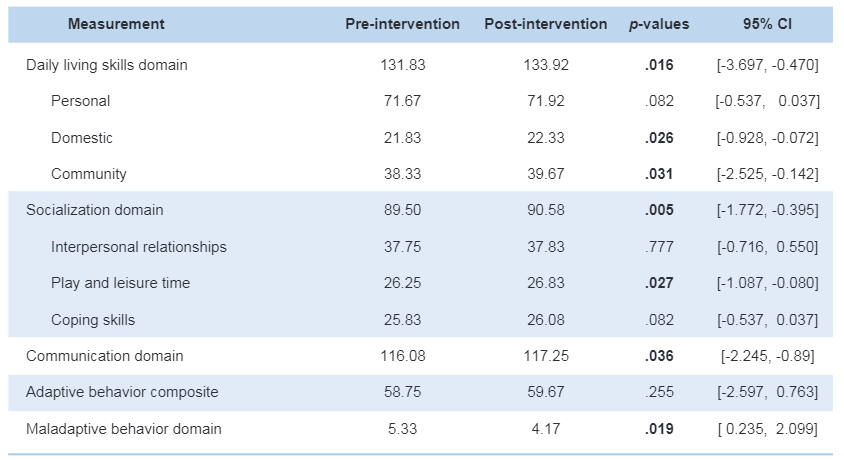Social Skills Training Using the Thai Version of UCLA PEERS® in Thai Adolescents with Autism Spectrum Disorder
DOI:
https://doi.org/10.33192/Smj.2021.61Keywords:
Social skills training, Program for the Education and Enrichment of Relational Skills (PEERS®), Thai adolescents, autism spectrum disorderAbstract
Objective: To study the feasibility and effectiveness of the Thai version of UCLA PEERS® in Thai adolescents with autism spectrum disorder (ASD).
Materials and Methods: The UCLA PEERS® was modified to fit with Thai culture. Twelve adolescents, aged 11-18 years old, with ASD participated in this modified 10-session weekly group intervention during March to October 2015 at Siriraj Hospital, Bangkok, Thailand. Feasibility was assessed by parent satisfaction and session attendance rate. Effectiveness was assessed by social skills improvement rated by parents, Vineland Adaptive Behavior Scales (VABS), the Children’s Depression Inventory (CDI), and the Clinical Global Impression-Improvement Scale (CGI-I).
Results: All enrolled participants completed the study. Parents’ satisfaction with the program was 81.92%. The session attendance rates ranged from 83.3 to 100%. At the end of intervention, all of the skills trained in the program were rated as improved by at least half of parents. At 4-month follow-up, all but two skills (entering conversation and handling bullying) were still reported as improved by more than 50% of parents. VABS raw scores significantly increased in the domain of communication (95% confidence interval (CI): -2.25 to -0.89; p=0.036), daily living skills (95% CI: -3.70 to -0.47; p=0.016), and socialization (95% CI: -1.77 to -0.40; p=0.005), and significantly decreased in maladaptive behaviors domain (95% CI: 0.24 to 2.10; p=0.002). Six adolescents had CGI-I scores of very much improved or much improved.
Conclusion: The Thai version of UCLA PEERS® is a feasible and effective social skills intervention for Thai adolescents with ASD.
References
2. Buhrmester D. Intimacy of friendship, interpersonal competence, and adjustment during preadolescence and adolescence. Child Dev 1990;61:1101-11.
3. Yoo HJ, Bahn G, Cho IH, Kim EK, Kim JH, Min JW, et al. A randomized controlled trial of the Korean version of the PEERS® parent-assisted social skills training program for teens with ASD. Autism Res 2014;7:145-61.
4. Schohl KA, Van Hecke AV, Carson AM, Dolan B, Karst J, Stevens S. A replication and extension of the PEERS intervention: examining effects on social skills and social anxiety in adolescents with autism spectrum disorders. J Autism Dev Disord 2014;44:532-45.
5. Gresham FM, Sugai G, Horner BH. Interpreting outcomes of social skills training for students with high incidence disabilities. Exceptional Children 2001;67:331-44.
6. Laugeson EA, Frankel F. Social skills for teenagers with developmental and autism spectrum disorders: the PEERS treatment manual. New York: Taylor and Francis Group; 2010.
7. Sparrow SS, Balla DA, Cicchetti DV. The Vineland adaptive behavior scales. 2nd ed. Circle Pines, MN: American Guidance Service; 2005.
8. Kovacs M. The Children's Depression Inventory (CDI). North Tonawanda, NY: Multi-Health Systems; 1992.
9. Trangkasombat U, Likanapichitkul D. The Children's Depression Inventory as a screen for depression in Thai children. J Med Assoc Thai 1997;80:491-9.
10. Guy W. Clinical Global Impression (CGI) In: Rush AJ, editor. Handbook of Psychiatric Measures. Washington, DC: American Psychiatric Association; 2000. p.100-102.
11. Laugeson EA, Frankel F, Gantman A, Dillon AR, Mogil C. Evidence-based social skills training for adolescents with autism spectrum disorders: the UCLA PEERS program. J Autism Dev Disord 2012;42:1025-36.
12. Rabin SJ, Israel-Yaacov S, Laugeson EA, Mor-Snir I, Golan O. A Randomized Controlled Trial evaluating the Hebrew Adaptation of the PEERS® Intervention: Behavioral and Questionnaire-Based Outcomes. Autism Res 2018;11:1187-200.
13. Schiltz HK, McVey AJ, Dolan BK, Willar KS, Pleiss S, Karst JS, et al. Changes in Depressive Symptoms Among Adolescents with ASD Completing the PEERS® Social Skills Intervention. J Autism Dev Disord 2018;48:834-43.
14. Shum KK, Cho WK, Lam LMO, Laugeson EA, Wong WS, Law LSK. Learning How to Make Friends for Chinese Adolescents with Autism Spectrum Disorder: A Randomized Controlled Trial of the Hong Kong Chinese Version of the PEERS® Intervention. J Autism Dev Disord 2019;49:527-41.

Published
How to Cite
Issue
Section
License

This work is licensed under a Creative Commons Attribution-NonCommercial-NoDerivatives 4.0 International License.
Authors who publish with this journal agree to the following conditions:
Copyright Transfer
In submitting a manuscript, the authors acknowledge that the work will become the copyrighted property of Siriraj Medical Journal upon publication.
License
Articles are licensed under a Creative Commons Attribution-NonCommercial-NoDerivatives 4.0 International License (CC BY-NC-ND 4.0). This license allows for the sharing of the work for non-commercial purposes with proper attribution to the authors and the journal. However, it does not permit modifications or the creation of derivative works.
Sharing and Access
Authors are encouraged to share their article on their personal or institutional websites and through other non-commercial platforms. Doing so can increase readership and citations.














